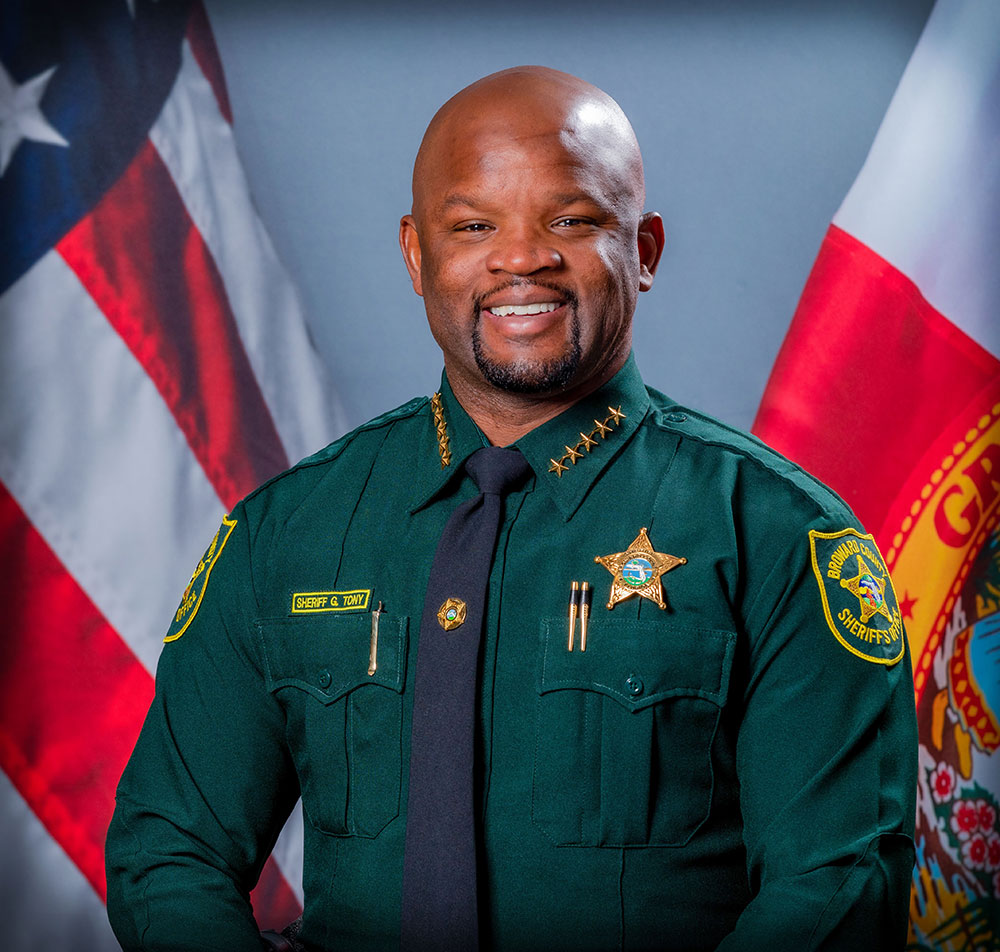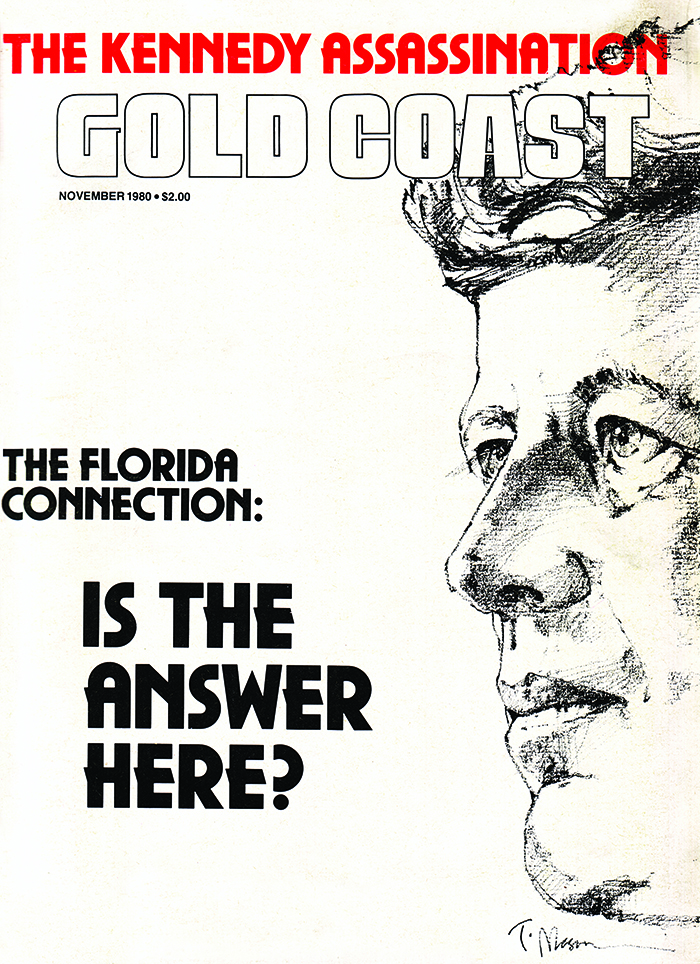The Bulldog Bites Again
Florida Bulldog, the independent investigative reporting group founded by Dan Christensen, has often made news over its 13-year history. But that news rarely gets picked up by newspapers, even when it has high local interest. An exception was recently when the Sun Sentinel, in a major story on embattled Broward County Sheriff Greg Tony, gave Florida Bulldog a one-sentence credit for originating the story. Dan Christensen discovered in 2020 that Tony had not revealed during his police career that he had been suspected of murdering a fellow teenager in Philadelphia in 1993. That should have disqualified Tony from ever becoming a police officer, much less sheriff of a large county.

When confronted with the story, Tony said he had been found innocent because he acted in self-defense, fending off an armed attacker. But it turns out the Philadelphia police investigation was shallow, and Florida Bulldog recently learned that several witnesses who were never called in the trial said Tony was not threatened. The victim was unarmed and Tony, after a street argument, took his father's weapon and shot the victim a number of times. Those witnesses thought they had witnessed a murder. That story was picked up in detail by the Sun Sentinel.
A story that to Christensen's knowledge has not been picked up by the Sun Sentinel or any other organization is his latest report on a subject he has pursued for years - the 911 attack. Christensen and Irish reporter Tony Summers got on that dramatic story when they learned that the 911 hijackers were aided by prominent Saudis living in Sarasota during the period when the hijackers trained for the attack. Christensen discovered that such contacts were known to the FBI but withheld from the 911 commission headed by former Governor and U.S. Senator Bob Graham. The government has released information in stages, but only after freedom of information lawsuits and constant prodding by Christensen and others.
Information, obviously known by the government for years, was recently quietly released. It effectively admitted that factions of the Saudi government provided assistance to the hijackers. It is hard to believe that these revelations have not gotten national attention.
Another interesting detail in released documents was reported recently by Christensen. It involves planes that appear to have been headed for disaster, but never got off the ground when flight controllers froze all takeoffs after the first planes struck the World Trade Center. One such plane was Delta flight 23 which was in the takeoff line at JFK Airport in New York. The pilot of that plane, Tom Mannello, was interviewed by Christensen. He recounted that when he heard an airplane had struck one of the Manhattan towers, he assumed it was an accident involving a small plane. Then came a second attack and word from Delta's flight dispatcher in Chicago communicating with Delta's 16 coast to coast flights. When advised of the Trade Center attacks, he warned pilots to protect their doors. Even though still on the ground, Mannello, immediately did that. When he warned flight attendants not to try to enter the cockpit, he was told the chilling information that four young Arabs were seated in first class. The plane taxied back to its gate and passengers got off. There was no word what happened to the four young Arabs.
The dispatcher who issued that warning was Ed Ballinger, who now lives in the Florida Keys. He has been haunted by the fact that information on the attack was slowed reaching him due to a communications problem. Had he issued his warning just minutes earlier, the pilots of Delta Flight 93, which crashed in western Pennsylvania, might have been able to fortify their door and prevent the hijacking. That was the plane where heroic passengers rushed the cockpit when they realized they had been hijacked. In the melee that followed, the plane went out of control.

Gaeton Fonzi established a connection between Lee Harvey Oswald and the CIA's anti-Castro leader in a three-part Gold Coast Magazine series.
Government concealment of dramatic information is unfortunately not new. We still don’t know key details of the Kennedy assassination. That is close to this writer’s personal history. Our former partner in Gold Coast Magazine, the late Gaeton Fonzi, began working that story in 1965 when he reported in Philadelphia Magazine that Arlen Specter (later a U.S. senator) could not explain his own “magic bullet” theory, the only way the Warren Commission could conclude that Lee Harvey Oswald acted alone.
Pennsylvania Senator Richard Schweiker recalled Fonzi’s work and hired him when he headed a committee reopening the investigation in the mid-1970s. As the primary investigator working in Florida, Fonzi, through anti-Castro Cubans, made a link between a top CIA man and Oswald shortly before the assassination. It confirmed Senator Schweiker’s view that Oswald had “the fingerprints of intelligence all over him.”
It is a long story, but that investigation was sabotaged by CIA friendly congressmen, when it began to question the CIA. Fonzi wrote most of its final report which concluded that there was a conspiracy (meaning Oswald was not alone) but left the conspirators unnamed. Disgusted, Fonzi wrote a book, “The Last Investigation,” which made a compelling case that the CIA was behind the murder of an American president, and that the original Warren Commission was a sham, controlled by the CIA and an accommodating FBI. The story first ran in Gold Coast and The Washingtonian magazines. It got almost no attention from the major media. And yet, when Fonzi died 25 years later, the New York Times called his book one of the best written about the assassination.
But still, JFK’s death remains largely mysterious. The government, as with 911, admits it knows more, but refuses to tell us.
Almost 70 years after the assassination, people, especially the young, ask why would anybody want to kill such a popular American president? Answer: He was not popular everywhere. The CIA, controlled by Allen Dulles, who had been fired by Kennedy after the Bay of Pigs fiasco, hated him. J. Edgar Hoover, who headed what at the time was a very political FBI, had a widely known distaste for the Kennedys.
At the time both the CIA and FBI were out of control, unaccountable in many respects. President Harry Truman, whose administration saw the CIA’s birth, later realized it was exceeding its purpose as an intelligence gathering organization. The CIA had become a shadow government, involved in coups and assassinations of foreign leaders, and often controlling U.S. policy. President Eisenhower also had seemed concerned about the CIA’s unchecked power. But Kennedy was the first to do anything about it. He spoke of dismantling the spy agency. Then he fired Allen Dulles, but Dulles still secretly ran the spy agency.
That was after the close call in Cuba, when the U.S. found Russia building missile sites there. JFK tried to end the cold war. He also wanted to limit U.S. involvement in Vietnam, which he foresaw as the disaster it turned out to be. These were the opposite of the CIA’s goals, and it considered Kennedy not only a threat to its very existence, but also a dangerous traitor. Hoover at the FBI felt much the same.
Both the CIA and FBI were so arrogant with power that their leaders thought they could murder an American president and get away with it.
And they did.

JFK
This Comment had been Posted by Laz
Bernie, Good work as usual. I recently read JFK and the Unspeakable. Notes Gaeton. Among the disturbing revelations (to me) was what the FBI did to Mr. Yates, simply a witness who would not change his story to fit the FBI narrative. Corruption at the FBI is not a recent phenom.